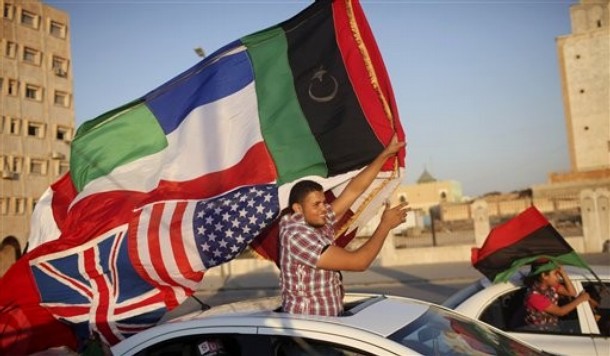
From Robert Marquand, the Christian Science Monitor: Despite Qaddafi’s prediction that Western leaders would fall “like Hitler and Mussolini” and his claims that he was "ready for a long war,” NATO weathered six months of a see-saw battle in Libya – and even within its own ranks – with a combination of patience, rebel training, and 19,000 sorties.
NATO’s Libya venture marked the first time that the United States stepped aside to let European powers take the lead in the world’s most successful military alliance.
Yet while British Prime Minister David Cameron and French President Nicolas Sarkozy are pausing to take due credit for a turn in the Libyan tide, there is significant doubt about the future of the transatlantic alliance forged from the anvil of post-war Europe.
With the Afghan war in a “wind-down” mode, and the US worried about debt ceilings and security concerns in the Pacific, the future of NATO after Libya may be in the hands of an increasingly divided Europe and guided by a generation on both sides of the Atlantic no longer shaped by cold war geopolitics.
Alexis Crow of London’s Chatham House argues, “NATO will of course continue … but it will move away from a collective defense organization to a loosely based alliance and a talking shop. . . .”
In a widely cited and unusually candid June 10 speech to NATO leaders in Brussels, [U.S. Secretary of Defense Robert] Gates said that "if current trends in the decline of European defense capabilities are not halted and reversed, future US political leaders – those for whom the cold war was not the formative experience that it was for me – may not consider the return on America’s investment in NATO worth the cost."
Fifteen years ago, the US footed 50 percent of NATO costs; last year the figure was 75 percent, and European spending on defense is going down. Of the 28 NATO nations signed on to Libya, only eight participated in operations, though partly this was due to a gap in the equipment and capability of members.
“Americans may feel rightful anger in Europeans not doing their share,” says Tomas Valasek, a defense and security specialist with the Center for European Reform in London. “But Europe showed a newfound political courage in Libya. The commentariat, and the Atlanticists in Washington, who used to be NATO defenders, have missed the main story in Libya.” (photo: AP)
Image: ap%208%2024%2011%20Libya%20flags.jpg
